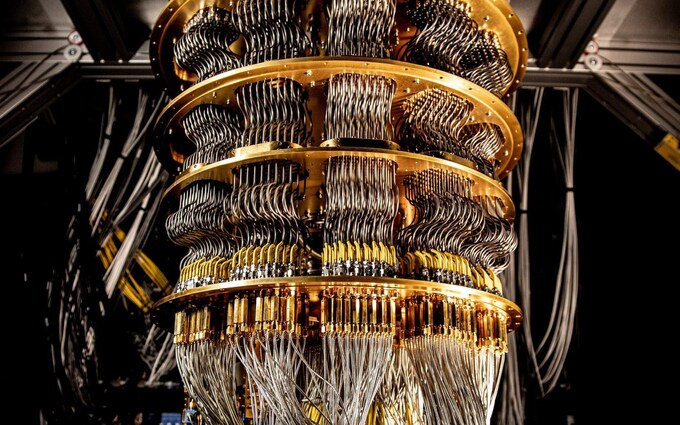Google Claims Latest Quantum Experiment Would Take Decades on Classical Computer

Insider Brief
- Google scientists are reporting in a new study that it completed a computational task on a quantum computer that would take a classical supercomputer 47 years to complete.
- The task was a random circuit sampling calculation.
- The experiment was carried out in the latest version of the Sycamore processor that has been boosted to 70 qubits.
- Image: Google Quantum AI
Staking another claim of quantum advantage, Google scientists are reporting that they completed a computational task on a quantum computer that would take a classical supercomputer 47 years to complete, the Telegraph reports.
Google scientist published their findings on the pre-press server ArXiv. Scientists often use the server to distribute findings before seeking official peer review.
The team used the latest version of Google’s quantum computer. In 2019, a 53-qubit machine, named Sycamore, was used in one of the first assaults on the quantum supremacy milestone. Quantum supremacy is a theoretical point at which a quantum computer performs a task well beyond the capabilities of a classical computer or supercomputer.
In this task, the scientists used an upgraded version of Sycamore, which features 70 qubits. You can think of a qubit as the fundamental unit of quantum information, just as a bit is the fundamental piece of classical information.
These additional qubits mean that the new processor is 241 million times more powerful than the previous version, The Telegraph reports, although other factors, such as coherence times, can affect the performance of quantum computers.
The researchers note the experiment is designed to answer questions that swirled around these classical vs. quantum competitions.
They write: “This intensifying quantum-classical competition motivates two questions: does there exist well-defined boundaries for the region where the exponentially large Hilbert space is, in fact, leveraged by a noisy
quantum processor? More importantly, can we establish an experimental observable that directly probes these
boundaries?”
In the experiment, the scientists performed a random circuit sampling task. In quantum computing, this involves testing the performance of a quantum computer by running random circuits and analyzing the resulting outputs to evaluate its capabilities and efficiency in solving complex problems.
According to The Telegraph, the researchers benchmarked their performance against Frontier, the world’s leading supercomputer, adding it would take 6.18 seconds to match a calculation from Google’s 53-qubit computer from 2019. In comparison, it would take 47.2 years to match its latest one.
The researchers report in the paper: “After estimating the needed computation resources and achievable fidelity bound for improved classical methods, we conclude that our demonstration is firmly in the regime of beyond-classical quantum computation.”
According to The Telegraph, the experiment is getting praise in the research community, although doubts of the practicality of the experiment still linger. The practicality of quantum computing tasks is one of the big criticisms of former quantum advantage experiments. As an example, most people do not have an immediate need for boson sampling or random circuit sampling, but do need access to less expensive pharmaceuticals.
Steve Brierley, the chief executive of Cambridge-based quantum company Riverlane, told The Telegraph: “This is a major milestone. The squabbling about whether we had reached, or indeed could reach, quantum supremacy is now resolved.”
Sebastian Weidt, the chief executive of Brighton-based start-up Universal Quantum, told the newspaper that quantum computers should aim at practical functions.
He said: “This is a very nice demonstration of quantum advantage. While a great achievement academically, the algorithm used does not really have real world practical applications though. We really must get to utility quantum computing – an era where quantum computers with many thousand qubits actually begin to deliver value to society in a way that classical computers never will be able to.”
The hope is that these more esoteric experiments eventually lead to equipment and practices that build a foundation for more practical calculations.
